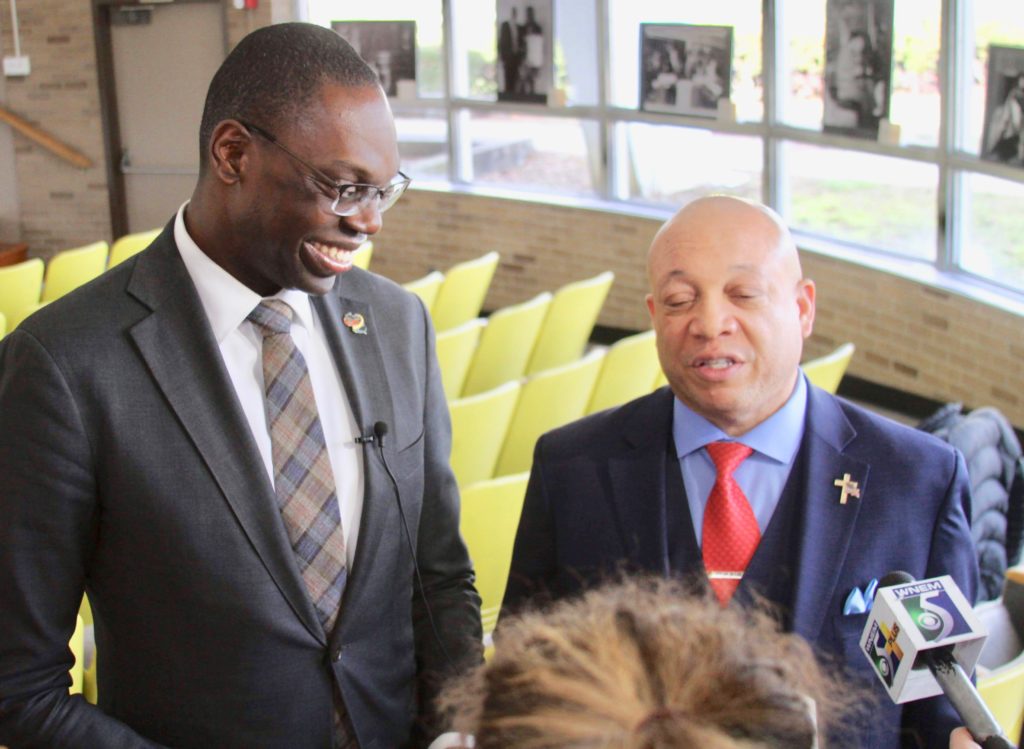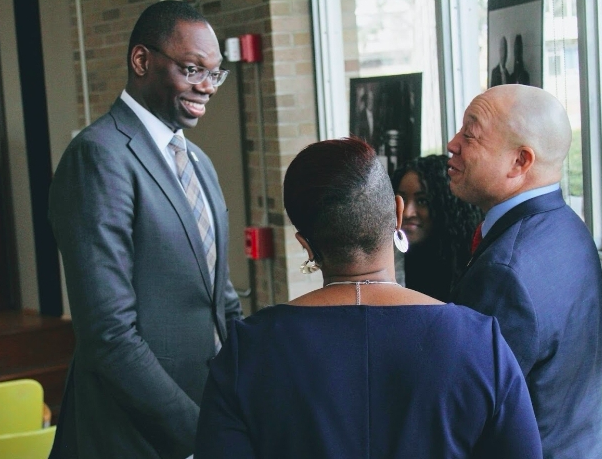By Jan Worth-Nelson
State of Michigan Lt. Governor Garlin Gilchrist said today under the dome in City Hall he has learned that “resilience is a matter of pride” in the city of Flint, and that is one of its messages to the rest of the country.
Hosted by Mayor Sheldon Neeley for part of his daylong visit, Gilchrist came to City Hall as a kickoff of Black History Month and to learn about the city’s history from Neeley, a lifelong Flint resident.
Meanwhile, the visit gave city officials and some in the community a chance to get better acquainted with the state’s first African American lieutenant governor, elected with Gov. Gretchen Whitmer in November, 2018.
Before the City Hall event, Gilchrist met with a group of 48 young black professionals at the Community Foundation of Greater Flint (CFGF), where he said he urged them “to be engaged in the work of policy, program design, decision-making– because we always need more perspectives.”

Lt. Gov. Garlin Gilchrist with Mayor Sheldon Neeley at City Hall today (Photo by Tom Travis)
A selection of historical photos provided by the Sloan Museum of Discovery lined the windows of the City Hall dome, and a video about the storied fair housing fight of 1968 ran on a loop with Sam Cooke’s version of “A Change is Gonna Come” playing in the background.
That video is available here on YouTube.
As detailed in a 2018 overview in East Village Magazine, 51 years ago Flint became the first municipality in the nation to adopt an open housing ordinance.
“Led by then-Flint Mayor Floyd McCree, the Flint City Commission adopted the ordinance by a 5-4 vote on Oct. 30, 1967. Four months later, on Feb. 20, 1968, it survived a referendum initiative by a mere 30 votes of the 40,000+ that were cast by the Flint electorate.
“The dramatic events of those few months that attracted the interest of the nation included: McCree stepping down as mayor, then reassuming his post; the largest civil rights protest in the city’s history; a sleep-in on the Flint City Hall lawn led by youth activist Woody Etherly Jr.; and public demonstrations by a local Ku Klux Klan chapter and the John Birch Society.”
Though Mayor Neeley, 51, wasn’t born until the following September, he said his older brother participated in the sleep-in.
Hearing Neeley talk about that part of Flint’s history, Gilchrist said, “People are proud to be from Flint. All of these historical figures are illustrations of a community of history makers — it’s important that people see the depth and breadth of people who have been difference makers in this community — I don’t think people are as familiar with that Flint story.

Lt. Gov. Gilchrist, Flint Mayor Sheldon Neeley, and newly elected 34th District State Representative Cynthia Neeley chat and view pictures on display from Sloan Museum. (Photo by Tom Travis)
Gilchrist himself is a 21st century history maker — the first African American lieutenant governor, and first African-American lieutenant governor to sign a bill into law — a moment Neeley said he was proud to have been present for.
At the Community Foundation gathering, Gilchrist, 37, who is the father of three kids — six-year-old twins and a seven-month-old — said work-life balance was a hot topic.
“Some of it was about our shared experiences,” he said. “I told them about trying to get my kids to school on time this morning before coming to Flint.”
He added, “I talked about how in our generation, we seek to not be pigeonholed. One of the reasons we jump around in our careers and jobs is not just because the economy is different, but because we have a lot of interests and skills that are diverse.
“The thread that connects my career is that I want to exercise different parts of my personality,” he said. He said his career path “has been very strange” — he has two engineering degrees, not typical for a lieutenant governor — and yet he believes that atypical background brings something important to his work.
“Engineering is all about problem solving, looking at a challenge and trying to break it into solvable parts,” he said. “We all have different training, if we have people with different perspectives at the table. I think at least we’re better off for it, a legal mind, a brilliant artistic mind…we can have more robust and creative responses to solving problems.”
Gilchrist commented that Flint is a place he’s spent more time than any other city beside Detroit, and that infrastructure issues in general, such as those faced by Flint during the water crisis, are of great interest to him.
“There’s been some important innovations that have happened to the city to get it the progress that’s been made,” he said.
Neeley said he valued Gilchrist’s Flint visit as a gesture of support and friendship with Gov. Gretchen Whitmer’s office.
As for Black History Month, he commented, “In American society we’re the sum of all of our parts — we’re not just dependent on just one nationality. There’s a great history of all of us, the great historic leadership of Flintstones, and I want to make sure residents in this community have the opportunity to know about it.”
“Today’s present is tomorrow’s history, to work toward our new greatness,” Neeley said.
EVM Editor Jan Worth-Nelson can be reached at janworth1118@gmail.com.


You must be logged in to post a comment.